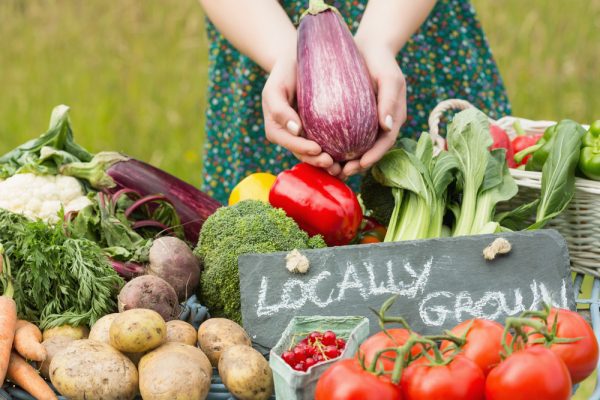4 Reasons to Buy Local Foods
I love bringing Mother Nature’s bounty into my kitchen — seasonal, fresh, locally grown.
Buying and eating local food is a daily choice for your health. To become more aware of the food you put in your body. To take climate change action. To support food and growers near you. An opportunity to help preserve farmland and green spaces. A way to connect with the earth.
Local produce is picked within 24 – 48 hours.
Why does it matter?
Better for Your Health
Locally grown crops are harvested at their peak. Produce arrives at the market within 48 hours of picking; this brings you giving the freshest produce from farm to table. Eating local means:
- More variety! This means more antioxidants, vitamins and phytochemicals for better health. Local farmers are more likely to choose varieties for flavor rather than yield. Large agricultural businesses that grow produce for distribution across the country choose varieties for high yield, fast growth rate, and ability to withstand long distance transport
- More nutrient dense because they ripen naturally. Produce that travels long distances is picked before it’s ripe
- More flavor!
- No ethylene gas, which is added to fruits imported out of season to artificially ripen.
- Contains less (or no) pesticides. Farmers have to pay an extra fee to become certified organic; some small-scale farmers use organic methods but aren’t certified because they simply cannot afford the certification fees. Even if they aren’t organic, small farmers tend to use fewer chemicals than large, industrialized farms.
Better for the Environment
- Eating more local food reduces carbon emissions by reducing food miles (distance food travels from farm to consumer).
- Buying local food helps preserve farmland and green space from development. When local farmers are well compensated for their products, they’re less likely to sell their land to developers.
- Farms also provide a habitat for wildlife and maintain the ecosystem.
- Helps more farmers switch to sustainable practices. The more you shop at local markets, the more these local farmers will thrive and grow.
Supports the Local Economy

- Money spent locally stays local. It helps local producers and is reinvested with businesses and services in your community. This helps grow your local economy instead of giving earnings to a corporation in another city/state/country.
- Local food moves through fewer hands. The money you spend goes to people growing those foods.
Creates Community and Connection
Shopping at a local farmer’s market connects you to where your food comes from.
Through Community Supported Agriculture (CSA) you can purchase seasonal produce directly from local farmers. A CSA-participating farm offer a number of “shares”. Generally you pay up-front. This helps pay for seeds and plants, greenhouse expenses, equipment, labor, and other costs related to the workings of the farm. The farm grows food for participating members. CSA members receive a weekly or biweekly share of the farm’s harvest. It’s a win-win. Community members become shareholders in the farm and the farm has a steady supply of revenues it can count on.
Did you know CSA’s began in Japan in the mid-1960s and 1970s, in response to consumer concern about the increasing use of pesticides in industrial farming?
I enjoy receiving farm fresh, seasonal vegetables every week from Central City Co-op! Find a local market here
For More Empowerment
7 Benefits of eating Local Foods
Why Buy Local Food? It’s Healthier for You and Better for the Environment
References:
- Nestle, Mario. (2006). What to eat. New York, NY: North Point Press.
- Hyman, Mark. (2020. Food Fix: How to save our planet, our economy, our communities, and our planet – one bite at a time. New York, NY: Little Brown Spark, Hatchette Book Group.
Updated from February 2018 post
